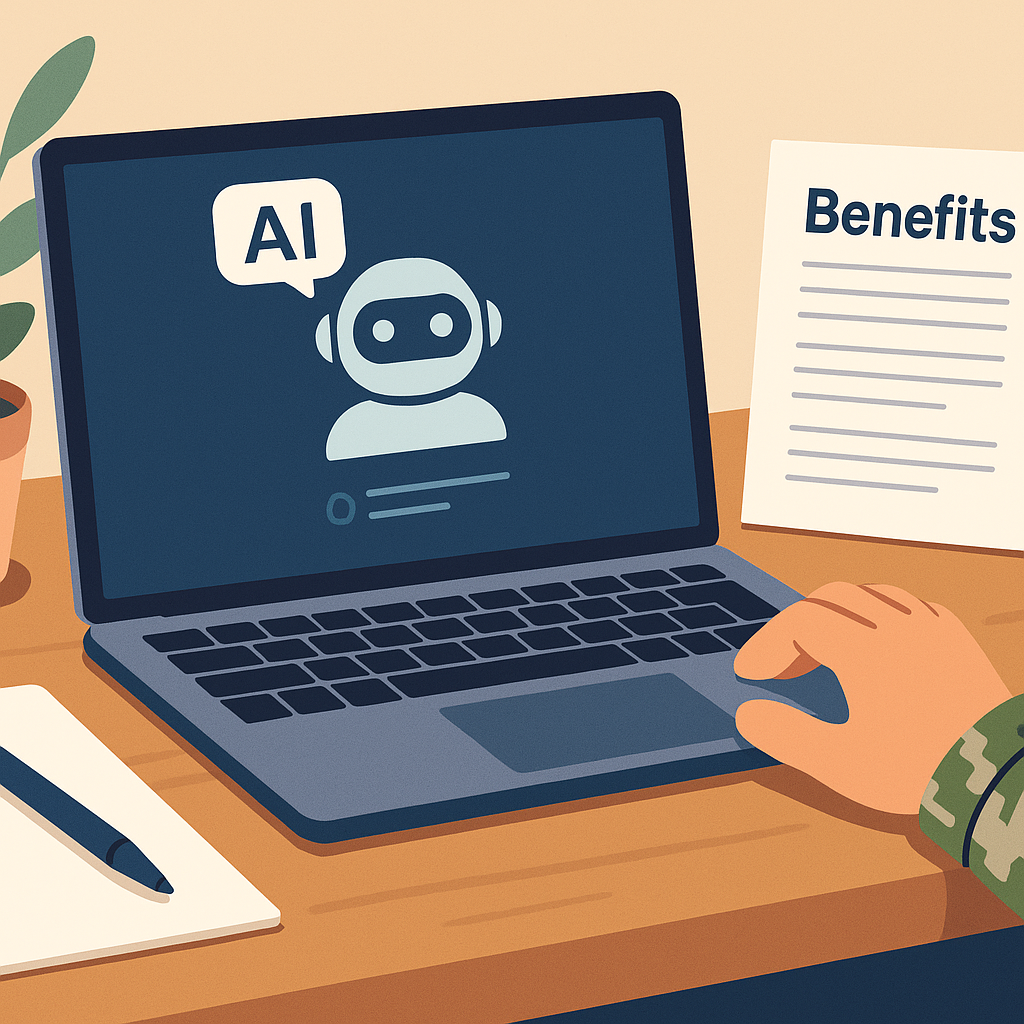- Our Work
-
-
PORTFOLIO
OTHERS
-
-
- Services
-
- How We Work
-
- Resources
-
- About Us
-
- Contact Us
- Let’s Talk
For millions of U.S. veterans, accessing the benefits they’ve earned through service can be a daunting, time-consuming process. Long wait times, complex paperwork, and fragmented service delivery systems often create barriers to vital support. Enter artificial intelligence (AI)—a powerful tool now reshaping how government agencies and nonprofit organizations serve the veteran community.
In this article, we explore how AI is transforming veteran services by automating benefits access, enhancing support systems, and streamlining communication. We’ll also look at the key technologies driving these changes and the real-world impact on veterans.
Why AI Matters in Veteran Services
Veterans often need access to a range of services including:
Healthcare and mental health support
Disability and pension benefits
Job training and placement
Housing assistance
Legal aid and case management
However, the systems that manage these services are frequently outdated, siloed, and slow to respond. AI offers a scalable solution to modernize these processes, making them faster, more efficient, and more accessible.
Key Ways AI is Improving Veteran Services
1. Automated Benefits Processing
Traditional benefit application systems can take weeks or months to process. AI-driven platforms use:
Natural Language Processing (NLP) to analyze forms and unstructured text
Machine Learning (ML) to predict eligibility
Robotic Process Automation (RPA) to streamline repetitive tasks
This results in faster decisions and reduced administrative burdens.
✅ Example: The VA (U.S. Department of Veterans Affairs) has piloted AI tools that scan claims for inconsistencies and prioritize urgent cases automatically.
2. 24/7 Virtual Assistants and Chatbots
AI-powered chatbots provide round-the-clock assistance to veterans seeking information or support.
Can handle FAQs about benefits, status updates, and application guidance
Provide multilingual, accessible support
Integrate with mobile apps, websites, or even SMS platforms
✅ Use Case: A veteran seeking housing assistance can interact with a virtual agent that walks them through local programs and application steps, without waiting on hold.
3. Personalized Support Recommendations
AI algorithms can analyze service history, medical records, and prior benefit usage to recommend tailored services.
Reduces redundant applications
Matches veterans with local programs or career opportunities
Flags high-risk individuals for proactive outreach
✅ Example: An AI model might identify that a veteran with PTSD symptoms and housing instability could benefit from both mental health counseling and a transitional housing program—automatically prompting caseworkers to take action.
4. Improved Case Management and Workflow
Veteran caseworkers are often overwhelmed by caseloads. AI systems improve their efficiency by:
Auto-generating summaries and reports
Tracking communication across platforms
Notifying staff of missing documentation
This means faster turnaround times and fewer dropped cases.
Technologies Behind the Transformation
Natural Language Processing (NLP) – Enables AI to understand and process human language in forms, emails, and voice transcripts.
Predictive Analytics – Helps forecast benefit eligibility, risk factors, and service outcomes.
Computer Vision – Useful in scanning documents and verifying identity through image processing.
RPA (Robotic Process Automation) – Automates repetitive administrative tasks, reducing human error and fatigue.
Challenges and Ethical Considerations
While promising, AI in veteran services is not without its challenges:
Data Privacy – Ensuring personal data is protected under HIPAA, FERPA, and federal privacy guidelines.
Bias Mitigation – Preventing discriminatory outcomes in eligibility models.
Transparency – Veterans should understand how decisions are made by AI systems.
FFP emphasizes responsible AI implementation, advocating for human-in-the-loop systems that blend machine efficiency with human empathy.
The Future of AI in Veteran Support
As government and nonprofit agencies look to modernize, AI will continue playing a pivotal role. We can expect:
AI-powered mobile applications for benefit management
Predictive mental health support tools
Blockchain integration for secure records sharing across agencies
At Finally Free Productions (FFP), we are actively exploring these technologies to support our partners in veteran care, service delivery, and government transformation.
Conclusion
AI has the potential to redefine how we serve those who have served us. By automating and optimizing critical workflows, artificial intelligence is not only reducing barriers but also elevating the standard of care for veterans across the nation.
At FFP, we believe in leveraging cutting-edge technology to create lasting impact—and there’s no better cause than supporting our veterans.
 All
All AI & ML
AI & ML Healthcare
Healthcare Education
Education Games
Games Fitness
Fitness Business
Business Webapps
Webapps Websites
Websites More
More Startup
Startup Web3 Development
Web3 Development Capabilities
Capabilities Game Development
Game Development Website Development
Website Development Prototyping Services
Prototyping Services Mobile App Development
Mobile App Development Client Dashboard
Client Dashboard Design Process
Design Process IP Protection
IP Protection Project Management
Project Management Working with Finally Free
Working with Finally Free FAQ
FAQ How to Videos
How to Videos About FFP
About FFP Meet The Team
Meet The Team Press
Press